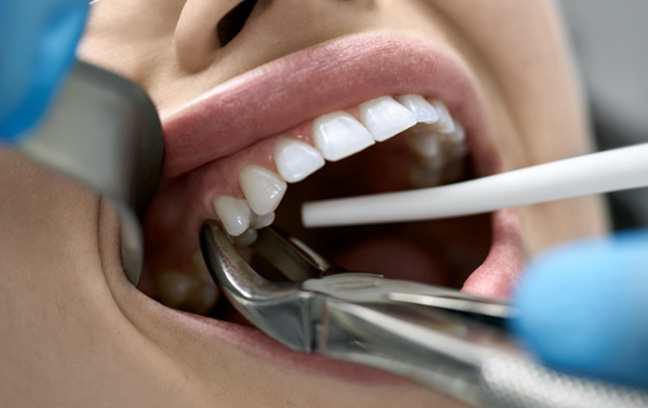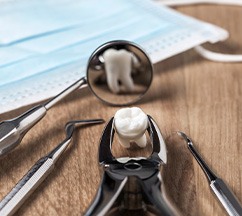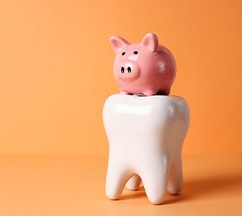Tooth Extractions – Spring Hill, TN
Getting Rid of Painful, Problematic Teeth

Making sure you can preserve as many of your natural pearly whites as possible is one of our top priorities. But in some cases, it’s essential to remove a painful or troublesome tooth to protect your dental and overall health. At Family Dental Associates of Spring Hill, our team may recommend tooth extractions as a last resort if one that is decayed or damaged poses a threat to the rest of your pearly whites. Read on to learn what to expect and how you can benefit from this emergency dental treatment , or give us a call if you need to make an appointment today!
Why Choose Family Dental Associates of Spring Hill for Tooth Extractions?
- Offers Same-Day Appointments For Emergency Patients
- Accepts Dental Insurance & Offers Alternative Financing
- Professional, Experienced, & Dedicated Dental Team
Reasons Why Tooth Extractions Are Necessary

While we’ll want to save or preserve your teeth with treatments such as dental crowns and root canal therapy, some cases may require an extraction to protect your dental and overall well-being. It can be beneficial to your long-term health and quality of life if we pull out a tooth due to:
- Severe or irreparable decay or damage.
- Advanced periodontal disease or jawbone loss.
- Serious infection in the tooth.
- Overcrowded teeth that’s preventing orthodontic treatment.
- A baby tooth that’s not coming out by itself.
- Wisdom teeth that will gradually erupt in a harmful or uncomfortable manner.
The Process of Removing a Tooth

There are typically two methods to extract a tooth. If the one that needs to be removed is already erupted from underneath the gum line, then we’ll likely be able to perform a non-surgical procedure. This will involve numbing the area of your mouth with local anesthetics to keep you comfortable throughout the treatment. We’ll then grab hold of the tooth with specially designed dental forceps, and shift it back and forth until it naturally detaches from the connective tissues.
However, if the troublesome tooth has not erupted or is impacted, then we may need to surgically extract it. Our team will make a small incision in your gums so that we can access more of the lower portion to remove it. Before we decide which option to take, you’ll need to visit us for a consultation. That way we can assess your situation, take X-rays, and determine the most efficient method to extract your tooth.
Tooth Extraction Aftercare

Once we’ve completed your treatment, our team will provide you with specific post-op instructions to ensure your recovery time goes smoothly. Here are several things you should practice while healing after your tooth extraction:
- Take your prescribed pain medication as directed, especially before the numbness from your procedure has fully worn off.
- Apply a cold compress or ice pack to the outside of your mouth.
- Stay away from hard, crunchy, spicy, sour, or sticky foods.
- Brush gently and carefully around your surgical site.
Should you notice any discomfort that persists or is getting worse after your tooth extraction, make sure to contact us right away for help!
Understanding the Cost of Tooth Extractions

If you’re hurting or have a troublesome tooth that needs to be removed, the last thing you want to have to worry about is whether you can afford the procedure required to alleviate the ache and preserve your dental health.
However, the cost of your extraction depends significantly on your unique circumstances, so our team in Spring Hill can’t provide an accurate estimate until after your initial examination. Continue reading to learn more about how the rate is determined and how we can help make your treatment more affordable.
Factors That Can Affect Tooth Extraction Cost

The pricing of your extraction depends on your individual circumstances and can potentially be impacted by a few different factors, including:
- Where the tooth is located. Molars in the back of your mouth are harder to access and are larger, so they sometimes need to be divided into smaller sections to be removed, which drives up the cost.
- The severity of your condition. If you have a severely damaged, infected, or impacted tooth that requires a specialist’s assistance, it can increase the final invoice.
- Replacement options. Whether you opt for a dental implant, a bridge, or dentures to close the space in your smile can affect the total amount due. For instance, implants tend to cost more upfront because they’re the only restoration that requires oral surgery.
Does Dental Insurance Cover Tooth Extractions?

Many dental insurance policies cover 50% of major procedures needed to protect and preserve your smile, including tooth extractions. However, there may be restrictions to be aware of, like a waiting period that must pass or a deductible amount you must pay before benefits can be applied.
It’s worth checking the details of your plan to verify what’s included. If you need help finding the information or with claims or paperwork, please let us know. Our friendly staff is familiar with the process and can help you maximize your available benefits.
How to Make Tooth Extractions Affordable

If you’re uninsured and are concerned that you can’t afford your tooth extraction procedure, don’t lose hope! Our team in Spring Hill believes that everyone deserves top-quality care they can rely on, regardless of their current financial situation.
That’s why we’ve partnered with CareCredit to offer flexible payment plans. If your application is approved, you can divide your total invoice into more manageable installments over a designated period that are easier on your wallet.
Tooth Extraction FAQs
Does getting a tooth extracted hurt?
Whether you need to have one or multiple teeth extracted, your dentist in Spring Hill will make sure you remain comfortable throughout your procedure. The first step they will take is to administer a local anesthetic to numb the area that they’ll be treating, meaning you won’t feel any pain during your extraction. However, you can expect to feel some soreness and discomfort after the anesthetic wears off. The good news is that this typically goes away within a few days and can be easily managed with over-the-counter pain medication.
How long does it take to recover from a tooth extraction?
Most patients tend to feel better within a few days of their tooth extraction in Spring Hill, but your gums and the extraction site won’t fully heal until about two weeks following your procedure. The best way to speed up your recovery is to follow our team’s aftercare instructions. These typically include:
- Avoid smoking for two weeks following treatment
- Regularly rinse your mouth with salt water, especially after eating
- Continue brushing and flossing like normal
- Take any prescribed medications as directed
- Do not use a straw or spit, because this could dislodge the blood clot
- Call your dentist if you experience any out-of-the-ordinary symptoms or severe pain
Do I need to replace a tooth that just got extracted?
We advise for you to replace any damaged teeth that are going to be extracted. In doing so, you can keep your surrounding teeth from shifting to fill the space in your arch. If you opt for dental implants, you can also prevent your jawbone from eroding over time due to a lack of stimulation and blood flow.
How long after a tooth extraction can I get dentures?
In many cases, although it’s important to keep in mind that no two situations are exactly the same, it takes between six and eight weeks after a tooth extraction to get dentures. After your gums have completely healed, Dr. Jewell will capture impressions of your gums that our team will send off to our dental laboratory that we work with. They will hand-craft your dentures to fit perfectly and look natural and send them back to our office for you to try on. If no further adjustments need to be made, you can take them home then!
How long does it take to extract a tooth?
For simple tooth extractions for teeth that aren’t impacted below the gumline, the procedure can take between 20 and 40 minutes. For more complex cases, it can take between 30 minutes to one hour to extract a tooth. Our team will walk you through these details during your consultation so you know what to expect.
